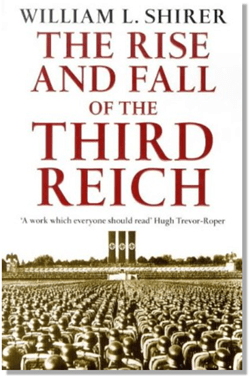
I am continuing to plow my way through The Rise and Fall of the Third Reich on a nightly basis (it’s a very long book). It’s probably the highlight of my day. I’m up to the summer of 1939 at this point, just before the invasion of Poland, and I wanted to share a few things that I’ve learned, or impressions that I’ve had. I’d like to preface this by saying I’m a fairly serious student of history – – probably in the 95th percentile (OK, probably more like 99th percentile) of U.S. citizens, and I am stunned at the level of my own ignorance as I work my way through this piece.
- 1933-1938 wasn’t easy: I always had the impression that once Hitler was made Chancellor, everything was a piece of cake for him. Not true at all. He had tremendous amounts of resistance. The majority of the public did not like the man, and did not vote for the man. Indeed, even at the height of propaganda and terror, when people knew their votes were being watched, he still couldn’t capture even 50% of the population’s vote. Most of the 1930s were very frustrating for Hitler, as he tried to work within the confines of established power and political realities to execute his vision.
- The church: Most churches, priests, and pastors rolled right over for the Nazis (in most cases, surely out of fear, not ideological agreement). I was stunned to understand how vast this cultural alteration was. Crosses were removed and replaced with Swastika banners. Bibles were removed (and banned) and replaced with Mein Kampf, which is a famously boring and poorly-written book. And if the churches were permitted to remain open, their staff had to pledge unwavering allegiance to the Fuehrer.
- WW2 was massively avoidable: Most of us have heard about an attempt to assassinate Hitler once it was clear they were going to lose the war. However, this was far from the only attempt by Germans horrified at what was happening to their country. There were multiple attempts and conspiracies to try to either kill, or at least remove from power, Adolf Hitler. Even in the autumn of 1938, the Army had put together a very sophisticated plot to remove Hitler from power, but it was ruined just when it was about to take place, because………
- Chamberlain sucked big-time: The king of appeasement, Neville Chamberlain is most famous for waving around a piece of paper and announcing “peace in our time”, when of course history would judge him as a naïve fool. The vague notion that perhaps, just perhaps, WW2 could have been avoided if, let’s say, Churchill had been in charge a couple of years earlier, is revealed to be stone cold true as one reads this book. Hitler would have been stopped in his tracks in early 1938 if Churchill was Prime Minister instead of the weak Chamberlain.
- It was all legal: Perhaps what surprised me the most is that every single thing Hitler did, every post he acquired, every morsel of power he attained, was done legally. I think most folks, me included, assumed he simply bludgeoned his way into power, but this isn’t really accurate. Yes, he used terror, surveillance, threats, and every dirty trick in the book, but he rigidly adhered to German’s constitutional law and, piece by piece, chipped away at the natural obstacles to attaining an absolute dictatorship, and doing so within the strict letter of the law every step of the way.
Keep in mind, I’m already knocked off my feet by this book, and the man hasn’t even entered Poland yet. So I suspect there are many more extraordinary things to learn, and it’s unfortunate that every adult in America isn’t familiar with this book, since it’s truly eye-opening.

